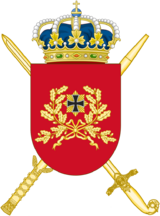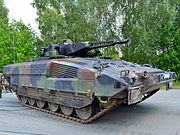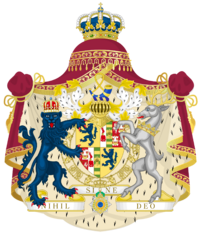Mascyllary Army
This article is incomplete because it is pending further input from participants, or it is a work-in-progress by one author. Please comment on this article's talk page to share your input, comments and questions. Note: To contribute to this article, you may need to seek help from the author(s) of this page. |
| Mascyllary Army | |
|---|---|
| Königliches Heer | |
 Badge of the Heer | |
| Founded | 19 April 1796; 224 years ago |
| Country | |
| Branch | Army |
| Role | Land warfare Maneuver combined arms operations Armoured and mechanized operations Airborne and air assault operations Special operations Command and control Combined operations Joint warfare |
| Size | 102,270 (December 2019) 140 aircraft 49,600 reserve personnel |
| Part of | Reichswehr |
| Motto(s) | Schützen und wahren. ("Protect and preserve.") |
| Colors | blue |
| Commanders | |
| Commander-in-chief | |
| Prime Minister | |
| Minister of Defence | |
| Generalfeldmarschall | |
| Colonel of the Regiment of the Army | |
| Vice Chief of the Army Supreme Command | |
| Notable commanders | General Markus Schmidt Generalleutnant Christoph Tichert Generaloberst Eberhard Schlag |
| Insignia | |
| War flag |  |
| Ceremonial flag |  |
The Mascyllary Army (Hesurian: Maskillisches Heer [maski:lɪʃəs he:ɐ̯]), or officially the Royal Army[a] (KH), is the army and branch for land warfare of the Reichswehr of Mascylla. The commander of the Army and chief of the Supreme Command of the Army is Generaloberst Ulrich Nielsen as Colonel of the Regiment of the Army, and is supervised by Generalfeldmarschall and current Chief of the General Defence Staff Wilhelm Brünar, Minister of Defence of the Realm Rüdiger Meißert and Prime Minister Thomas Falkner.
As of 2020, the branch had a strength of 102,270 active soldiers and 49,600 reserve personnel, 140 aircraft, operated fifteen army bases, and maintained presence at three other military installations. Its size makes it the second-largest army within the Telmerian Union. The Mascyllary Army was founded in 1796 as part of the military of the Mascyllary Kingdom following its foundation; it has since then been the continued land force of the country, and is the considered to be the oldest and most senior branch of the Mascyllary military.
The Army's mission is to support the objectives of the Reichswehr and the Ministry of Defence at large: "to protect the integrity and safety of Mascylla and to promote, sustain, and support peace and security internationally." In comparison to its other branches, the Army has reportedly been rather neglected in terms of actual combat readiness and the technological sophistication of its equipment, though modernization waves as recent as 2021 have largely mitigated this issue. Though it is specifically for land-based affairs, the other branches of military also maintain land power suited for their maritime, lettoral and land environments respectively. The Army also maintains a small flotilla of aircraft for reconaissance and rescue operations.
Structure and organisation
The Mascyllary Army is de facto administered by the Mascyllary Ministry of Defence and thus its executive minister, but retains a ceremonial position under the sitting Monarch as the country's commander-in-chief of all of its armed forces which is in turn exercised by the Prime Minister as head of government. The most senior army officer is the Field Marshal of the Army (Generalfeldmarschall des Königlichen Heeres, FMH) who, though ceremonial in essence and not part of the chain of command in peacetime, reports directly to the Minister of Defence, the Monarch and Prime Minister. The Colonel of the Regiment of the Army (Oberst des königlichen Heeresregiments, OHR) is the main administrative and command position within the Army, and is a member of and supported by the Supreme Command of the Army (Oberkommando des königlichen Heeres).
The Army is one of the three branches of the Reichswehr and one of the six organizational fields of the armed forces. Due to its significance within the military, it has historically continuously been the most well-equipped and largest branch. Political actions have been undertaken to strengthen its organization and equipment portfolio in light of aging hardware and operational neglect.
Formations
 Army Corps Command (Kommando königliches Heereskorps), HQ in Augusthal
Army Corps Command (Kommando königliches Heereskorps), HQ in Augusthal
 1st Armored Division (1. Panzerdivision), HQ in Weidenau
1st Armored Division (1. Panzerdivision), HQ in Weidenau
- Divisional troops
- 2nd Armored Brigade (2. Panzerbrigade) in Barnau
- 9th Mechanized Infantry Brigade (9. Panzergrenadierbrigade "Aussland") in Weissenfeld
- 4th Armored Brigade (4. Panzerbrigade) in Gieben
- 17th Armored Brigade (17. Panzerbrigade) in Kinzighausen
- 8th Mechanized Brigade (8. Brigade Gieben) in Gieben
- 73rd Artillery Battalion (73. Artilleriebattalion) in Mayern
 2nd Infantry Division (2. Infanteriedivision), HQ in Böhmkirch
2nd Infantry Division (2. Infanteriedivision), HQ in Böhmkirch
- Divisional troops
- 20th Armored Brigade (20. Panzerbrigade) in Zweitstrom
- 5th Mechanized Infantry Brigade (5. Panzergrenadierbrigade "Eystrun") in Gessbach
- 49th Armored Demonstration Brigade (49. Panzerlehrbrigade) in Lehpold
- 1st Mountain Infantry Brigade (1. Gebirgsjägerbrigade "Weißenhaupt") in Manneskirchen
- 13th Mechanized Brigade (13. Brigade Mickop) in Mickop
 9th Infantry Division (9. Infanteriedivision), HQ in Olserbrünn
9th Infantry Division (9. Infanteriedivision), HQ in Olserbrünn
- Divisional troops
- 56th Armored Brigade (56. Panzerbrigade) in Wittenbreit
- 192nd Mechanized Brigade (192. Brigade Dreiwalde) in Dreiwalde
- 5th Armored Brigade (5. Panzerbrigade) in Geinau
- 1st Airborne Division (1. Fliegerdivision) in Halnburg
 24th Cavalry Division (24. Kavalleriedivision), HQ in Sindeln
24th Cavalry Division (24. Kavalleriedivision), HQ in Sindeln
- Divisional troops
- 397th Mechanized Infantry Brigade (397. Panzergrenadierbrigade "Amsern") in Dalbeck
- 30th Armored Brigade (30. Panzerbrigade) in Kahlfels
- 11th Mechanized Brigade (11. Brigade Lauplatz) in Lauplatz
- 82nd Mountain Infantry Brigade (82. Gebrigsjägerbrigade) in Freida
- 104th Armored Brigade (104. Panzerbrigade) in Ordenberg
- 17th Artillery Battalion (17. Artilleriebattalion) in Marlau
- 2nd Artillery Demonstration Battalion (2. Artillerielehrbattalion) in Lehpold
 1st Rapid Forces Division (1. Schnellkräftedivision), HQ in Theodorichheide
1st Rapid Forces Division (1. Schnellkräftedivision), HQ in Theodorichheide
- Divisional troops
- Special Operations Command (Kommando Spezialoperationen, KSO) in Woltzar
- 101st Airborne Division (101. Fliegerdivision) in Manneskirchen
- 4th Air Assault Brigade (4. Luftangriffsbrigade) in Stakau
- Special Aerial Command (Kommando Spezialflieger, KSF) in Sternburg
- 67th Airborne Infantry Brigade (67. Fliegerinfanteriebrigade) in Lingen
- 141st Air Assault Brigade (141. Luftangriffsbrigade) in Stakau
- 90th Air Assault Infantry Brigade (90. Luftangriffsinfanteriebrigade) in Ausern
- Army Logistics and Reserve Command (Kommando königliche Heereslogistik- und reserve), HQ in Stättveilheim
- Army Central Depot (Zentrales königliches Heereslager) in Hammelheide
Locations
The Army is stationed in barracks throughout the entire country. Merely the states of Ihlarn, Pereuth, Flussmund, Königsreh and Langquaid do not host any major military facility or troop locality. The military facilities themselves, such as barracks, depots and training grounds, are however not directly commandeered by the army staff, but rather the Ministry of Defence of the Realm or the Joint Support Services of the Reichswehr. Major army installations outside Mascylla are jointly administered with the respective country's infrastructure commands of their militaries.
Truppengattungen
Modern equipment
Vehicles
| Model | Image | Origin | Type | Number (2019) | Notes |
|---|---|---|---|---|---|
| Armored vehicles | |||||
| G-2 Braunbär |  |
Main battle tank | 302 active 472 available |
Number to be increased to 900 vehicles by 2030, 80 vehicles to be upgraded to G-2B standard by 2025. | |
| Wolf |  |
Infantry fighting vehicle | 295 active 212 available |
Future replacement for Löwevehicle. Number to be increased to 600 by 2035. | |
| Löwe |  |
Infantry fighting vehicle | 317 active 545 available |
250 Löwe vehicles to be upgraded to IK-a Löwe model by 2030. Gradual phasing-out planned until 2050. | |
| M17-R Büffel |  |
Armored personnel carrier | 509 active 625 available |
Additional deliveries planned for 2025. | |
Ranks and insignia
Officers
| BDTA code | OF-10 | OF-9 | OF-8 | OF-7 | OF-6 | OF-5 | OF-4 | OF-3 | OF-2 | OF-1 | OF(D) | Student officer | ||||||||||||||||||||||||
|---|---|---|---|---|---|---|---|---|---|---|---|---|---|---|---|---|---|---|---|---|---|---|---|---|---|---|---|---|---|---|---|---|---|---|---|---|
| Generalfeldmarschall | Generaloberst | General der Waffengattung | Generalleutnant | Generalmajor | Oberst | Oberstleutnant | Major | Hauptmann | Oberleutnant | Leutnant | Fähnrich | |||||||||||||||||||||||||
Non-commissioned officers and others
| BDTA code | OR-10 | OR-9 | OR-8 | OR-7 | OR-6 | OR-5 | OR-4 | OR-3 | OR-2 | OR-1 | |||||||||||
|---|---|---|---|---|---|---|---|---|---|---|---|---|---|---|---|---|---|---|---|---|---|
| Stabsfeldwebel | Oberfeldwebel | Feldwebel | Unterfeldwebel | Unteroffizier | Stabsgefreiter | Hauptgefreiter | Obergefreiter | Gefreiter | Soldat | ||||||||||||
Notes
- a.^ Hesurian: Königliches Heer, IPA: [kø:nɪklɪçəs he:ɐ̯]; lit. 'royal army'
